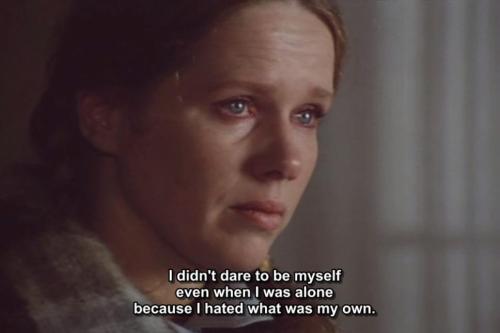These essays are specifically for reading after ones personal viewing.
What strikes me first is the religion. As the head nurse makes her rounds, the undertone of her questions are a rhetorical utterance of how they should know God is with them. And that this – their pain and suffering – is "part of a bigger picture." None of them seem to believe her, which made me wonder, do you enter the hospital knowingly of this preaching? It’s called Grace Hospital, but nobody except one, who seems to be in a vegetable-like consciousness, is wanting or acceptingly a part of these religious feedings. This made me feel uncomfortable in her presence, and also juxtaposed my preconceived notions of how I thought the human mind worked close to death; instead of reaching out to God in their last hours, calling his name for the fear of the unknown, they threw Him away. But I'm able to understand – as most of their lives have been filled with pain, cancer not being the first spell – at times it seems or perhaps it is, that God has left, or was never there.
Having watched most of Allan King's Actuality Dramas, it helps to be an experienced viewer of vérité, to be able to break-into this new sense of viewing. Having the ability to openly interpret his films, one can then experience these new emotions, undistributed disturbed by a period of confused watching.
Having watched most of Allan King's Actuality Dramas, it helps to be an experienced viewer of vérité, to be able to break-into this new sense of viewing. Having the ability to openly interpret his films, one can then experience these new emotions, undistributed disturbed by a period of confused watching.
There's a whole tone and voice any director/writer is trying to communicate with you. They're trying to immerse you in this new sense of feeling. Just like a novel. And like novels, we watch films one after another, experiencing different emotions and themes, which are personal to each creator. Sometimes (most of the time) when I read a new book, it takes time for me to escape the tone and voice of the last book I read, and pull myself into this new world, so fluidity may compliment my reading as I understand this new writer's sense of tone and voice. For films, I feel we plague our first viewings either by the last films we watched, or mostly by our own sense of personality, instead of watching with an open eye for the filmmaker's voice. Not that the films we love can't also be important to us personally, but that's not the only reason to love or enjoy a film. Now, it also depends on the filmmaker to have the ability to immerse his/her viewer's in his voice, but, I truly think a film should be a combined effort of both filmmaker and viewer. So even when you don't love a film, after viewing it with an openness of both the makers voice and personal undertones, you may be able to respect and enjoy the film for the vision and talent if it is genuine.
During my viewing, I developed a new filmic sense of emotion: I wanted to throw up from my sadness. I know it sounds terrible, and it was, but when dealing with death, I don't believe it could be any other way. I was then met with an odd aftertaste. When it was done and over, I felt....fine. I was able to lay down and sleep without the worry and anxiety which usually takes over my scattered mind before sleep. It was a sense of peace. Did King somehow instill in me a small sense of hope or acceptance within the walls of the Grace Hospital. That is the true gift of an artist: To instill a new sense of emotion and in turn, feel the relation of man through art. It is wholly inspiring to experience, and I hope to someday be on the side of its creation.
Always,
The Seafairy


